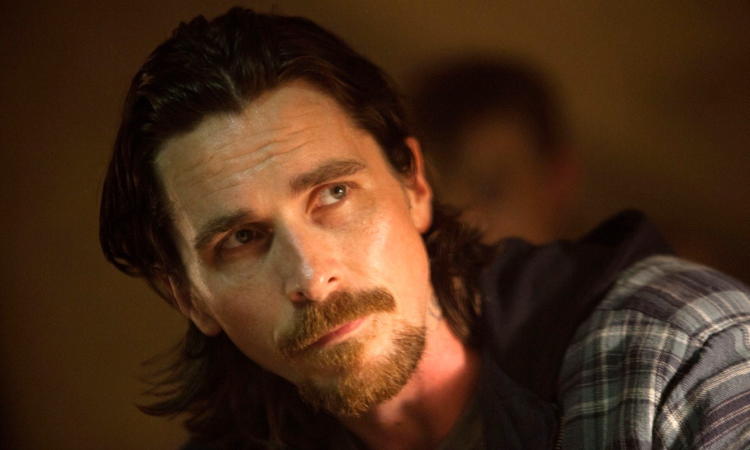By Garrett Hunter · November 27, 2013

In this, only his 2nd feature film, writer/director Scott Cooper (Crazy Heart) continues to apply his Midas touch on his actors. Out of the Furnace produces some mesmerising performances.
Set and shot in the grainy steel-town atmosphere of Braddock, Pennsylvania, the film conveys the austere beauty of industrial decay. Here is a portrait of Americans on the ropes; forgive the boxing parlance but this is a film about fighters, the working man fighting daily against his inevitable slide onto the scrap heap, the returning soldier fighting as hard to survive in America as he did on the battlefield in Iraq.
It is the story of two brothers, Russell and Rodney Baze (respectively Christian Bale – Batman Begins, The Machinist & Casey Affleck – Ocean’s Twelve, The Last Kiss). Russell is the type of son Springsteen sang about in The River, from a town where “..they bring you up to do just like your daddy done”. After working at the steel mill each day, he calls in to care for his father, a father who is dying, we suspect, from a lifetime working at the same steel mill. Younger brother Rodney, a soldier, home from fighting in Iraq, sees what the mill has done to his father and has no intention of following that route. Seeking quicker money, he first tries gambling and then, to pay his gambling debts, bare-knuckle fighting.
Russell is almost too good to be true, a nurse to his father, an angelic older brother – he pays off much of Rodney’s gambling debts – and a caring and sensitive partner to his live-in girlfriend, Lena (Zoe Saldana – Avatar, Blood Ties). Yet just when you think he has enough to deal with, fate lands him a cruel blow, and he finds himself in prison. By the time he is released, his father is dead, Lena has left him for local cop, Wesley Barnes (Forest Whittaker – The Butler, The Crying Game), the steel mill is about to close, and his brother is so deep in debt he must associate with some decidedly unsavoury characters in order to find ever more dangerous and higher paying fights.
The man to whom he both owes money and fights for is John Petty (William Defoe – The Aviator, The English Patient). What for Petty is a cosy business arrangement, he bets on the pre-arranged outcome of Rodney’s fights, is for Rodney an unhealthy downward spiral, and he knows it. Keen to clear all his debts in one go, he persuades a reluctant Petty to arrange a big money fight against the ‘inbred’ community ruled by sociopath Harlan DeGroat (Woody Harrelson – The Hunger Games, Now You See Me). DeGroat has the opening scene in this film, and it is a scene of such brutality that his every subsequent appearance on screen creates tension. We know, as we see Petty and Rodney drive into DeGroats world, disaster waits.
Rodney fails to return to Braddock and Russell does what any hard working honest man would, he goes to the police for help. With the police chief, Wesley, sleeping with his ex, and yet impotent when it comes to finding (or even looking for) Rodney, Russell – finally – begins to awaken to the truth; America and its justice system was not built for the likes of him. After a futile foray into ‘inbred territory’ he must devise a plan to bring DeGroat to him.
Harrelson’s DeGroat has the power to become one of our favourite on screen baddies. He exudes such menace that when the climactic scenes arrive, we expect a momentous battle between good and evil, and we know, win or lose, he will find a way to express the ruthless evil we know him to possess. The entire final encounter, however, falls short of our expectations. It seems cropped and almost hurried, and although it satisfies and rounds the story, it doesn’t deliver on the promise the opening scene set up, which was to shock us out of our skins. Instead, perhaps a more cerebral conclusion is offered, one which questions which way discarded Americans will turn, towards or away from the rule of law. For this is the choice Russell must make, and DeGroat, in the final scene, seems to know the answer; we can see it in his eyes.
The film as a whole is a success: a great cast working from a good script, with sparse and well-defined dialogue. Cooper’s honest directorial approach focuses on the performances, and what performances he draws. Defoe can express more in a body movement than many actors can in a monologue, and he uses his talents exquisitely here. The surprise package is Affleck, in his heaviest role to date, as a returning war veteran with hellish memories burning behind his eyes; he can light up the screen. It is Harrelson, however, who steals this show. He is majestic as the king of the underclasses. Here is an actor at the peak of his energies, and just as Affleck can add light, Harrelson can draw the light in, and darken it – too early to talk of an Oscar?
Bale can play exceptional and the extraordinary characters with aplomb, but this portrayal of an ordinary man isn’t entirely satisfying. Perhaps this is due to his humility and generosity in playing Russell as rather flat-line. He does not pander to our desire for him to explode from his inertness. It is left to Affleck to provide the luminance, and Harrelson to steal it away.
From Out of the Furnace comes, a family, an industry, and an entire class of society in meltdown. It is a film which portrays a bleak and somewhat hopeless landscape of modern America, but how enjoyable the artistry.
4 out of 5 Stars